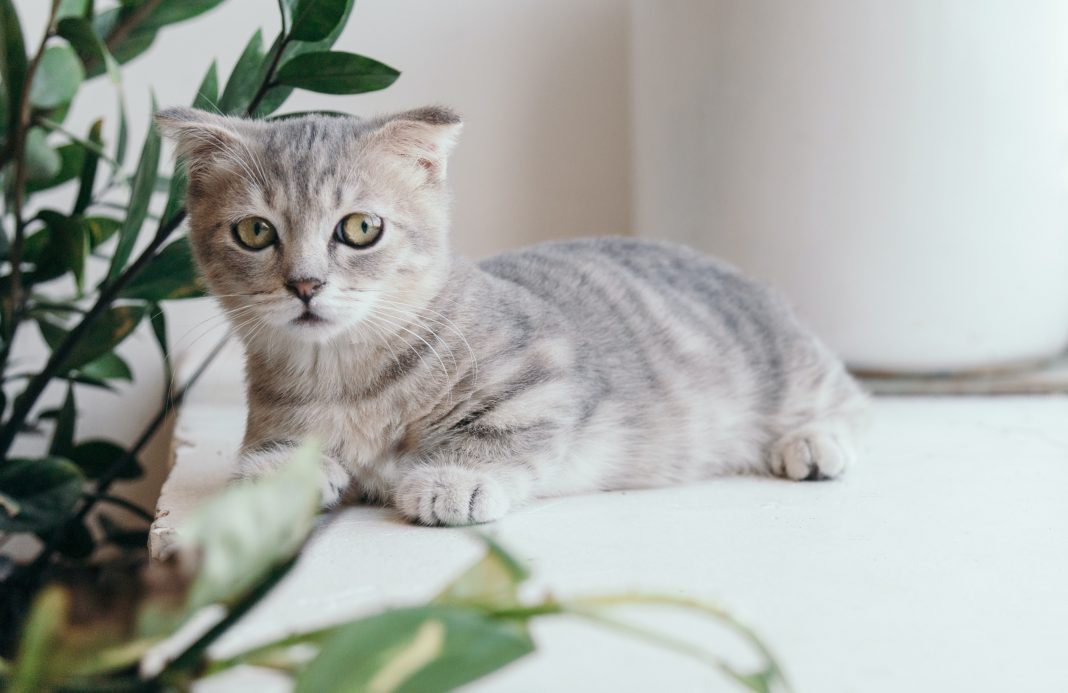Looking for the Best Dehydrated Cat Foods? Dehydrated cat foods offer a nutritious and convenient alternative to fresh or canned options, retaining essential nutrients while providing a longer shelf life. These foods are especially beneficial for busy pet owners seeking to provide high-quality diets without sacrificing convenience. In this article, we will explore top dehydrated cat food options in the market, each providing balanced nutrition to support your feline’s health and well-being. Learn about these products’ unique features and benefits, helping you choose the perfect one to satisfy your pet’s dietary needs and taste preferences.
1. Rawz Dehydrated Chicken, Turkey & Chicken
The Rawz Dehydrated Chicken, Turkey & Chicken Recipe Natural Dry Cat Food is a nutritionally complete and balanced diet for cats of all life stages. It does not contain any gums or additives and is cooked in smaller batches to ensure food safety. With healthy levels of highly digestible protein and reduced carbohydrates, this cat food uses dehydrated chicken as its concentrated protein source, while also being meal-free and free from rendered ingredients.
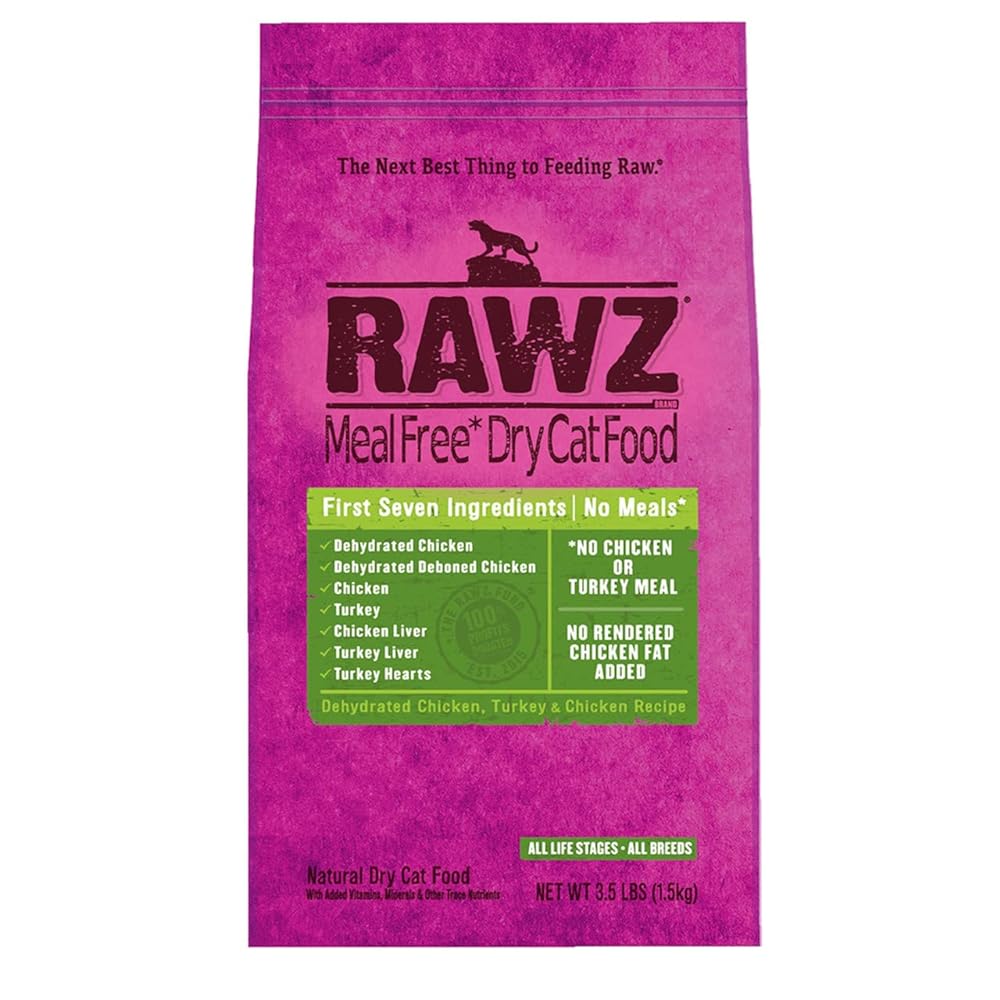
2. The Honest Kitchen Dehydrated Grain Free
The Honest Kitchen Dehydrated Grain Free Chicken & Fish Cat Food is a 2 lb box that can make 8 lbs of fresh food when warm water is added. It is made with free-range chicken, wild-caught white fish, and real whole-food ingredients that are gently dehydrated for maximum taste and nutrient retention. This recipe contains no artificial preservatives, fillers, GMO ingredients, or grains, and is 100% human-grade. It is suitable for cats of all life stages and is made in the USA with trusted sources from around the world.
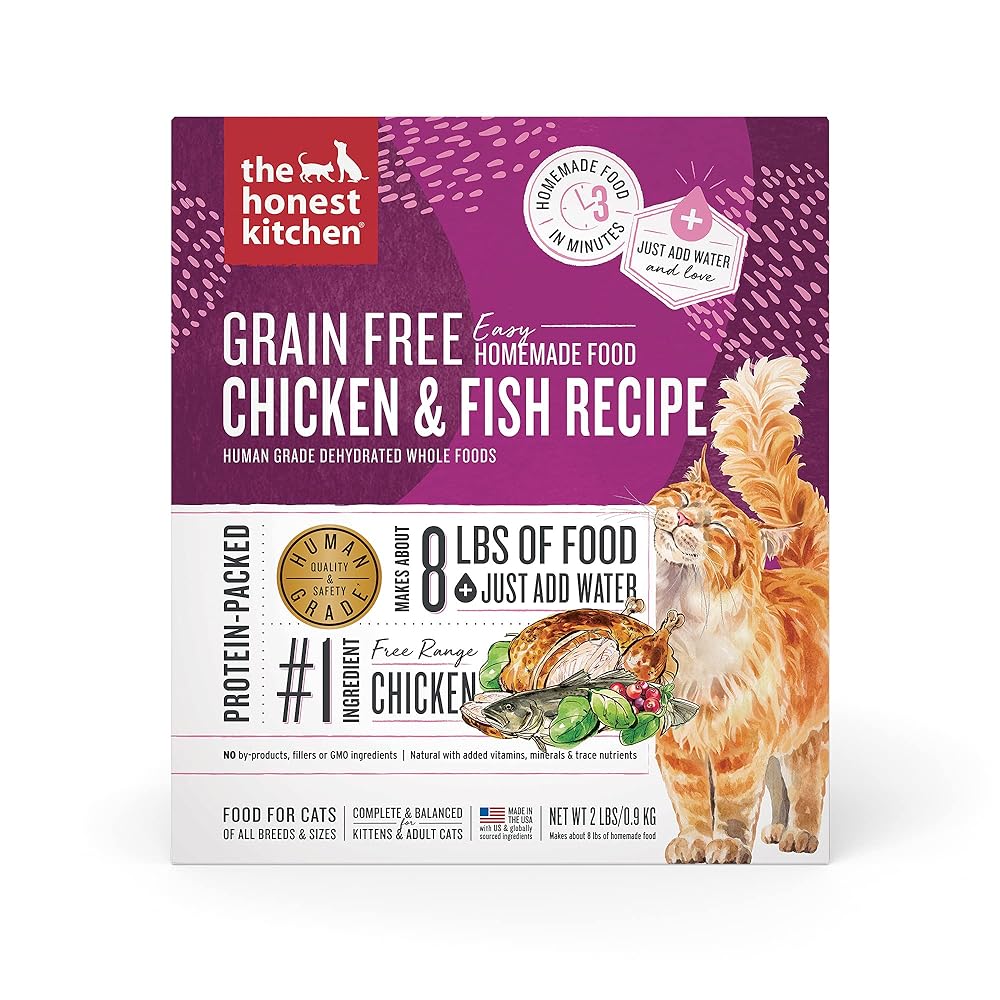
3. Honest Kitchen Human Grade Dehydrated Whole Grain Dog Food
The Honest Kitchen Human Grade Dehydrated Whole Grain Dog Food is a complete and balanced meal or topper option for dogs. It can be easily prepared by adding warm water, with a 10 lb box making 40 lbs of fresh food. The recipe includes human-grade, free-range chicken and wholesome ingredients like organic oats, carrots, and bananas. It is suitable for both puppies and adult dogs, and it is free from preservatives, by-products, fillers, GMO ingredients, and common allergens like corn, wheat, and soy. Additionally, the product is produced by a certified B Corporation, ensuring high standards of social and environmental performance.
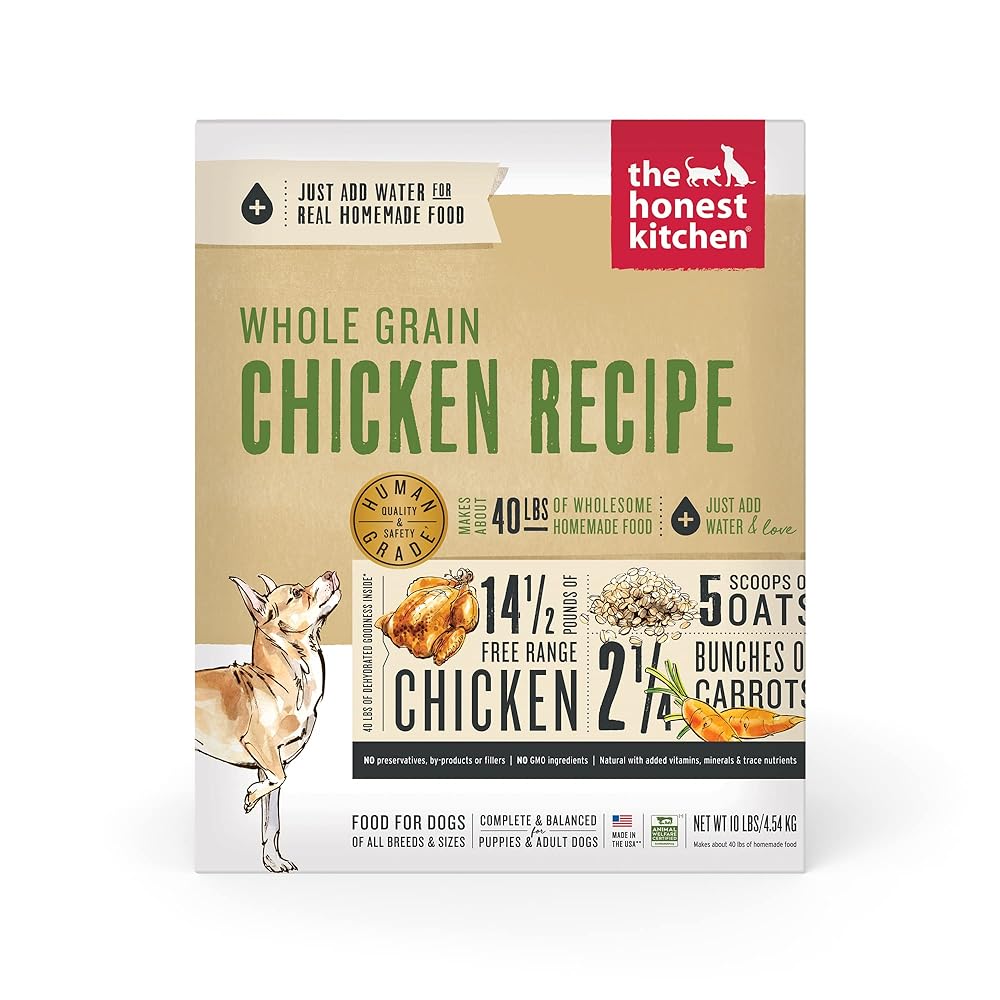
4. Rawz Salmon, Dehydrated Chicken & Whitefish Recipe
The Rawz Salmon, Dehydrated Chicken & Whitefish Recipe Natural Dry Cat Food is a 3.5lb bag of cat food that is high in protein and free from potatoes and grains. Made from a combination of salmon, dehydrated chicken, and whitefish, this formula offers a natural and nutritious option for cat owners looking to provide their pets with a balanced diet. The absence of grains and potatoes can be beneficial for cats with specific dietary needs or sensitivities.
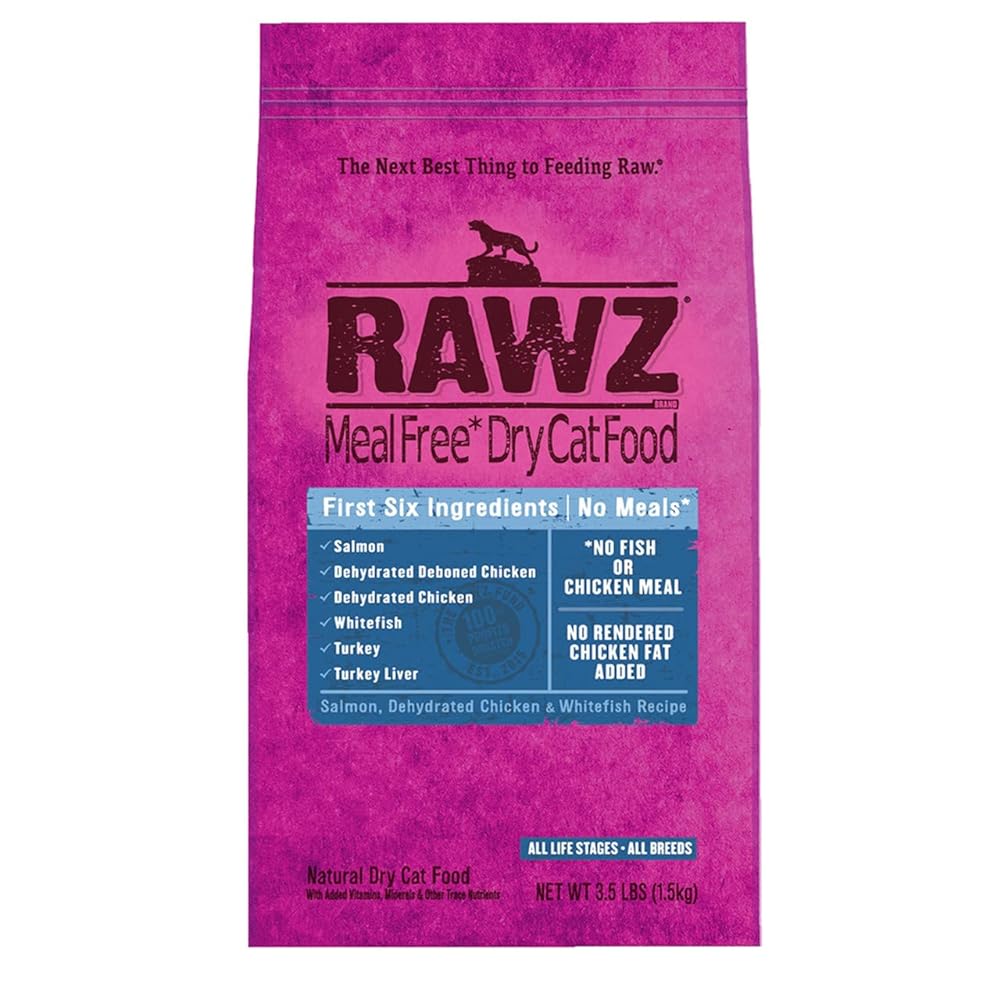
What Should I Look For When Choosing a Dehydrated Cat Food?
When selecting a dehydrated cat food, consider the following crucial factors to ensure it aligns with your pet’s nutritional needs and preferences:
- Quality of Ingredients:
- Opt for a product with high-quality, natural ingredients. The ingredient list should primarily consist of recognizable items, with meat as the first ingredient, reflecting a protein-centric diet appropriate for obligate carnivores like cats.
- Nutritional Balance:
- The food should offer a balanced nutrition profile, encompassing appropriate proportions of protein, fats, and carbohydrates. Also, look for essential vitamins, minerals, and fatty acids to support overall cat health.
- No Harmful Additives:
- Avoid foods that contain artificial preservatives, colors, and flavors. Opt for those with natural preservatives, like tocopherols, or those that use the dehydration process itself as a preservation method.
- Brand Reputation:
- Choose a brand with a solid reputation for producing safe, high-quality pet foods. Look at customer reviews and consider whether the brand has been involved in recalls in the past.
- Hydration Process:
- Understand that dehydrated cat food requires rehydration before feeding. Ensure you’re comfortable with the preparation process, and consider whether it fits your lifestyle and feeding routine.
- Specific Dietary Needs:
- If your cat has specific health or dietary requirements, like food allergies, obesity, or chronic conditions, select a dehydrated food that aligns with these needs.
- Taste and Palatability:
- Cats can be picky eaters, so consider their taste preferences. Many brands offer sample sizes, which can be a low-risk way to test whether your cat enjoys a particular dehydrated food.
- Cost and Value:
- While dehydrated cat foods can be more expensive than traditional kibble, weigh the cost against the nutritional value and benefits the food offers to your cat.
Before making any significant changes to your cat’s diet, consider consulting with a veterinarian who can provide personalized dietary recommendations based on your cat’s health status and nutritional needs.
What Are The Benefits of Dehydrated Cat Foods? What Are The Downsides?
Benefits:
- High Nutritional Value:
- Dehydrated foods often retain more nutrients than conventional dry foods since they undergo a gentle drying process. Essential vitamins, minerals, and enzymes that might be lost during high-heat processing are preserved.
- Quality Ingredients:
- Many dehydrated cat foods are crafted with premium, whole food ingredients, providing a wholesome and natural diet for your feline.
- Long Shelf Life:
- The dehydration process removes moisture, preventing the growth of microorganisms and extending the product’s shelf life without the need for artificial preservatives.
- Hydration:
- Since dehydrated cat food requires rehydration, it can help increase your cat’s water intake, supporting kidney function and overall hydration.
- Ease of Digestion:
- The quality and nature of the ingredients in dehydrated foods often make them easier for cats to digest, which is beneficial for cats with sensitive stomachs.
- Portability & Storage:
- Without the weight of water, dehydrated foods are lightweight and easy to store and transport, making them an excellent option for traveling with your pet.
Downsides:
- Preparation Time:
- Dehydrated foods require preparation time, as they need to be rehydrated with water before feeding, which might not be as convenient for some pet owners.
- Cost:
- High-quality dehydrated cat foods can be more expensive than traditional wet or dry foods due to the quality of ingredients and the dehydration process.
- Palatability:
- While many cats enjoy dehydrated foods, others may need time to adjust to the texture and taste. It might not be immediately accepted by all cats.
- Dietary Adjustment:
- Switching to dehydrated food might require a transition period for your cat’s digestive system to adjust. Abrupt changes in diet can lead to digestive upset.
Frequently Asked Questions About Dehydrated Cat Foods
- What is dehydrated cat food?
- Dehydrated cat food is a type of pet food that has undergone a drying process to remove moisture while preserving the nutrients in the ingredients. This process results in lightweight, shelf-stable food that can be rehydrated before feeding.
- Is dehydrated food suitable for all cats?
- While many cats can benefit from dehydrated food, it may not be suitable for all. Cats with specific dietary requirements or medical conditions should have a diet that’s vet-approved. Always consult with a veterinarian before making significant changes to your cat’s diet.
- How do I prepare dehydrated cat food?
- Preparation is straightforward: mix the dehydrated food with warm water and let it sit for the recommended time on the packaging, usually around 10-15 minutes. This process allows the food to rehydrate and become palatable for your cat.
- Can I feed my cat only dehydrated food?
- Dehydrated cat food can serve as a complete diet as long as it meets all the nutritional requirements of your cat. Check the product labeling to ensure it is formulated to be a ‘complete and balanced’ diet and consult with your veterinarian.
- Why is dehydrated cat food more expensive?
- The cost often reflects the quality of ingredients and the specialized dehydration process. High-quality dehydrated foods often contain premium, whole-food ingredients without fillers, artificial preservatives, colors, or flavors.
- How long does dehydrated cat food last?
- Dehydrated cat food typically has a long shelf life, often ranging from 6 months to a year or even longer, due to the removal of moisture which inhibits bacterial growth.
- Is dehydrated cat food grain-free?
- Many dehydrated cat foods are grain-free, but it’s essential to check the ingredients list on each specific product. Grain-free options are available for cats that are allergic or sensitive to grains.
- Can I mix dehydrated food with kibble or wet food?
- Yes, you can mix dehydrated food with other types of cat food as long as the combined diet meets your cat’s nutritional needs. Again, it’s advisable to consult with a veterinarian to ensure a balanced diet.
- Does dehydrated cat food help with hydration?
- Since dehydrated cat food is rehydrated before feeding, it can contribute to your cat’s daily water intake, supporting hydration, which is crucial for their kidney health and overall well-being.
- Can kittens eat dehydrated cat food?
- Kittens can eat dehydrated cat food if it is formulated to meet their unique dietary needs. It’s crucial to feed kittens a diet that supports their rapid growth and development, so always check the label and consult with a veterinarian.
Final Summary: The Best Dehydrated Cat Foods
In this article, we reviewed the Best Dehydrated Cat Foods. Dehydrated foods offer convenience without compromising on your cat’s nutritional needs. The products highlighted are exceptional for their quality, nutrient retention, and ease of use. Always consider your pet’s specific dietary requirements and consult a veterinarian before introducing new foods into their diet. With the right dehydrated cat food, you can provide a nutritious, tasty, and easily stored feeding option that supports your feline’s health, making mealtime enjoyable and stress-free for both you and your beloved pet.

